THE high costs for pet owners faced by unexpected vet treatments have been highlighted by the RSPCA in a campaign to raise awareness of the difficulties suffered by those who don’t have insurance.
With pets visiting the vets around twice a year on average, keeping an animal can become expensive and any ongoing and unexpected vet treatments can quickly add up.
The animal-rescue charity is braced for an influx of dogs and cats over the festive season and in the new year from owners who lose interest or say they are unable to cope with the cost of keeping a pet.
Highlighting the importance of insurance due to the high costs involved in saving a beloved pet, the RSPCA cited the experience of Godalming resident Phil Sleight, who was forced to take out a bank loan when his cat Bella was injured.
Phil was very worried when Bella went missing for several days in August. She eventually managed to drag herself back home, but she had most likely been hit by a car, or possibly fallen from a tree, and was suffering with a broken leg.
“A few months after getting our cat Bella, we shopped around for pet insurance but with a combination of being busy working parents and forgetful, we just never got around to putting a policy in place,” he said.
“Bella is an active outdoor cat and is only two years old. She is in and out frequently but then one day she just didn’t come home. A couple of days passed and we were really worried, so I went out looking for her after work but didn’t find her. We live next to a busy road and I did fear the worst but I couldn’t see or hear her on the side of the road.
“After being missing for three days, which felt like an eternity, I was sitting in the front room when I heard her meow. I raced to the front door and there she was staggering back.
“She looked awful, was covered in fleas and had a heavy limp. I took her straight to the local vet who examined her straight away. Whilst she was not bleeding externally, they said she was in need of a blood transfusion and had a broken leg. The x-ray revealed a number of breaks to her upper leg close to her hip which the local vet said was beyond his expertise to repair.”
Bella was referred to Godalming-based Fitzpatrick Referrals, founded by Channel 4 ’super vet’ Noel Fitzpatrick to see if the pioneering clinic could help. Luckily, the practice was confident it could save her leg, but as Bella was uninsured the family were faced with a big decision to make.
Amputation would be a considerable amount of money itself, but repairing the leg with metal rods would cost in the region of £5,000.
Phil added: “We were given a few nights to make a decision, because the focus was finding a suitable blood donor. After a blood donor was found, I quickly made the decision to go ahead with the repair, which I funded by getting a bank loan. I just wanted to give her the best quality of life possible as she was still so young – even if it did break the bank. I thought I could earn that money back but she won’t grow another leg if we went down the amputation route.
“Thankfully the operation was a success and we were able to take Bella home that night. Although she was on cage rest for the next six weeks, she is now back to her normal, energetic self again.
“We just thought it would never happen to us. Needless to say, I have since taken out pet insurance and will encourage every other pet owner to do the same to avoid having to make that difficult decision.”
Caroline Allen, the RSPCA’s chief veterinary officer, found herself in a similar situation when she decided to foster a dog in her previous job at a private vet practice, fell in love with her but then found that she had a joint condition and paid £3,000 for surgery.





Comments
This article has no comments yet. Be the first to leave a comment.